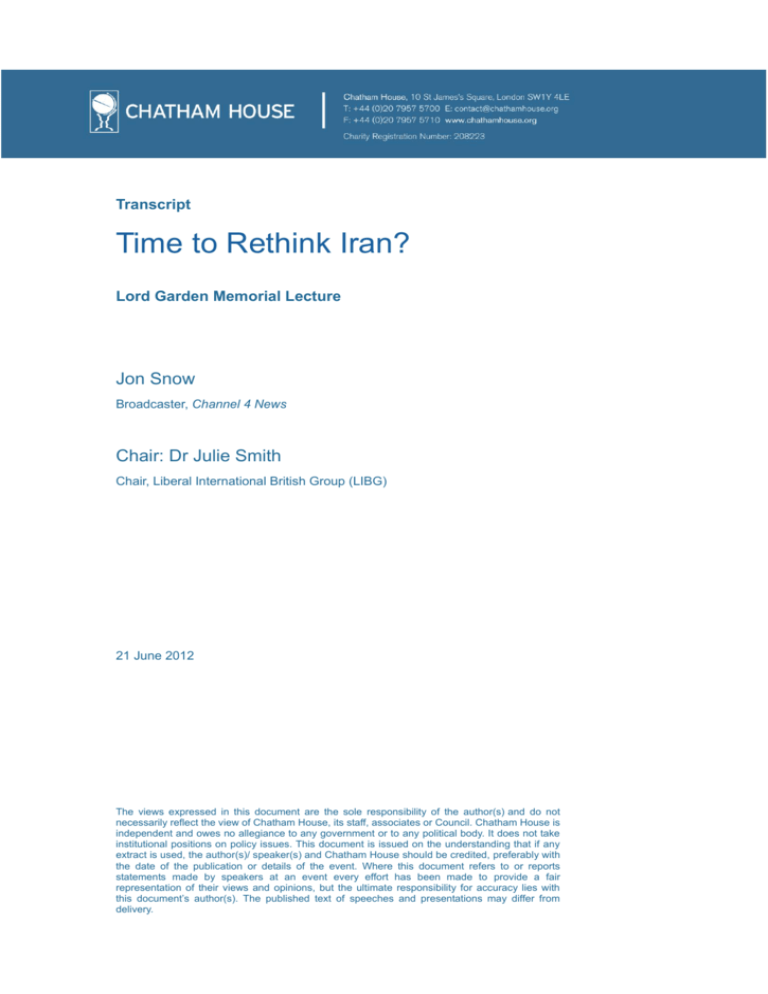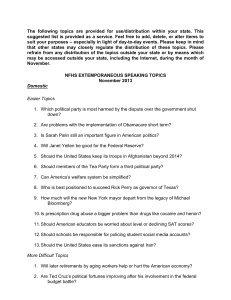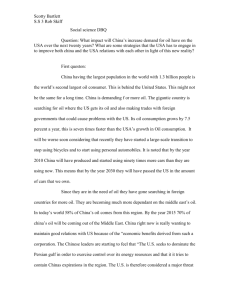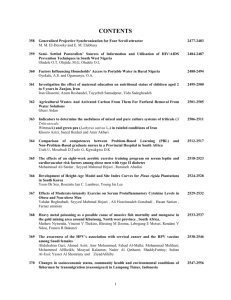Transcript - Jon Snow pdf | 180.47 KB
advertisement

Transcript Time to Rethink Iran? Lord Garden Memorial Lecture Jon Snow Broadcaster, Channel 4 News Chair: Dr Julie Smith Chair, Liberal International British Group (LIBG) 21 June 2012 The views expressed in this document are the sole responsibility of the author(s) and do not necessarily reflect the view of Chatham House, its staff, associates or Council. Chatham House is independent and owes no allegiance to any government or to any political body. It does not take institutional positions on policy issues. This document is issued on the understanding that if any extract is used, the author(s)/ speaker(s) and Chatham House should be credited, preferably with the date of the publication or details of the event. Where this document refers to or reports statements made by speakers at an event every effort has been made to provide a fair representation of their views and opinions, but the ultimate responsibility for accuracy lies with this document’s author(s). The published text of speeches and presentations may differ from delivery. Transcript: Time to Rethink Iran? Julie Smith: Good afternoon. I'm Julie Smith. I'm the Chairman of the Liberal International British Group, which co-organises this event annually with Chatham House. It's the annual Tim Garden Memorial Lecture. Tim was a Liberal Democrat Peer. After a career in the military, he mixed academe with politics, was Director of Chatham House. And one of his lesser known roles was at President of the Liberal International British Group. That was the reason we thought it would be good to have an annual lecture. This is the fifth in the series. And Sue, Tim's widow, decided that actually it might be time to have a journalist. We haven't has a journalist speak before. We've had various distinguished speakers, politics and from academe. And hence we invited Jon Snow to speak to us today. Jon Snow: Well, it's a very daunting honour to be allowed to speak in memory of Tim and his beloved Chatham House. And to do it actually here, which is not a thing I often do. I'm not an expert. I am a hack, there's no question about that. But he was an inexhaustible expert. And the strange thing was, once he became a Liberal Democrat Peer, we barely noticed because we still had him on as an expert. He just happened to be a Liberal Democrat as well. But he was an analyst who could really explain what he had analysed. A lot of people can analyse stuff but not actually then talk about it very coherently. So he had great gifts and we miss him a great deal. He was wonderfully friendly and decent and understanding. He would have proved at the tender age that he would have been now, only 67, a more than useful force in our virgin peacetime engagement with coalition politics. I am more than mindful that I have chosen a subject to speak about which many people in this room are far more expert in talking about than I am. But I speak today not as an academic, and certainly not as someone of Tim's analytical calibre, but as one who has spent a lot of time in Iran down the years, some of it with Tom Fenton – who is here in the front row – from CBS. And I've met and talked with elements of its leadership, interviewed successive presidents from Banisadr to Ahmadinejad, who I've actually now met nearly half a dozen times. I've met many others, from the formidable global Iranian Diaspora, from which Britain herself benefits so considerably. But the timing is not mine. The timing is Sue's, because when she asked me what I wanted to talk about three or four months ago, maybe more, maybe six www.chathamhouse.org 2 Transcript: Time to Rethink Iran? months ago, I said I'd like to talk about Iran. And at that point, things were pretty dead. Well they weren't, they were extremely lively. People were talking about bombing Iran and of course they're still talking about bombing Iran today. It's a fashionable thing to do, to talk about bombing Iran. Actually I think if anyone wants to bomb Iran, they should bomb it with laptops, because that's actually what people really yearn for; connectivity. But nevertheless we have these relatively abortive and hopeless nuclear talks, which I think are more of a charade for the West than they are for Iran. I don't think... The West is so desperate now to try and avoid some awful shemozzle, because heaven only knows that if somebody did bomb Iran, the consequences are absolutely unfathomable. But it's my argument today that we could not have constructed a worse relationship with another country than we've managed with Iran. It has been a huge endeavour to get ourselves into the condition that we're now in, in which a country that is a formidable regional power is now so alienated from everybody about. And it's very easy to say that they're all bonkers, that the Supreme Leader is a difficult man, that the leadership is divided, that they're corrupt and that they're messianic and the rest of it. But I'm afraid to say, at the end of the day, it is a country that has not invaded another country in 300 years. It's a country which interestingly has not yet bombed London or indeed New York or Washington or the Pentagon, or more or less anywhere else. And there are plenty of countries that we could point to with whom we have most fraternal relationships which have had a hand in bombing places of interest to ourselves. We have troops in the field in, I estimate two countries covertly and two overtly, in which Wahhabi fundamentalists are very actively in play, in which Saudi money for example has played an active part. And which you could even say Saudi inspiration has played a formidable part in bringing them about. And yet, we are totally allied with the Saudi faction of life, and we are virtually at war with Iran. And I want to argue today that this is a ridiculous condition to have got ourselves into and that in many ways, we've allowed ourselves to do it without really thinking seriously about it. I want to take you just very quickly through history, because I think history, recent history in Iran tells you a great deal about why we're in the mess we're in now. 1978-79, I was sent to Iran, only because somebody came into the newsroom and said, ‘Is there anybody who has ever been to Iran?’ And I put my hand up, because I'd been on the hippie trail in 1970 and driven an old www.chathamhouse.org 3 Transcript: Time to Rethink Iran? Bedford fan to Tehran. Why we'd gone there, I don't really know, except that we had a band and in those days, that was what you did. But anyway, you got a taste of it, and I got a taste of a pretty special place. I think one of the things, of course, is that Iran conjures the most extraordinary kind of reactions. It is a place of unbelievable beauty. It's a place with the most incredible history, culture, depth. I mean, I'm afraid to say that they were working on alphabets when we were crawling on our stomachs in the caves. That is unfortunately a fact. They were at it 3,000 or 4,000 years BC and if not slightly more. At any rate, I was there for the revolution. And the revolution was, make no mistake about it, a popular revolution on a massive scale. It's still the biggest movement of people I've ever seen in one place. Millions of people on the street. It was a passionate and it was an Islamic event. And there it is. That's what it was. We may not like it, but that's what it was. It was an Iranian revolution, and you have to determine how you're going to deal with this. Well, many of us dealt with it by deciding we didn't like it and that we wouldn't have anything to do with it. And I believe that from the outset that was not a very good idea. But of course, we were naive in those days. We knew less about Islam and we knew less about Shiadom and we knew less about how to relate to people who perhaps had religious passions. Actually, on the day of the revolution, frankly the streets were so jammed that I said to my crew, ‘You know what we're going to do? We need to find out why this matters. And you know one of the reasons why it matters? It matters because the most important listening post for Soviet atomic testing is on the Caspian Sea. And they've lost it. We've lost it. We don't have it anymore. We will no be able to tell what the Russians are doing.’ All the way through the Shah's reign, we had this wonderful listening post and we were able to tell to the most minute detail what had been fired and how much nuclear material had been detonated. And so I said, ‘Let's go there. Let's find it.’ And the funny thing is that when I drove through in 1970, I saw it and I knew what it was because we lived in Yorkshire. My dad was a bishop up there. And we used to go, he was the bishop of Whitby, and we had to drive across the moors and there were these golf balls, [inaudible] and they had golf balls. On the bottom of the Caspian Sea, at the bottom, you would drive from Tabriz all the way towards Afghanistan and there in the right hand corner, just before you turned left for Russia, boing, there they were. www.chathamhouse.org 4 Transcript: Time to Rethink Iran? And I remembered they were there, but I couldn't say exactly where they were. So I took my crew up and I said, ‘Right, we'll turn right at Tabriz,’ and we arrived and found the golf balls. And drove up, there were two 16 year old revolutionary guards sitting with Kalashnikovs across their knees on tubular chairs. And they were a little worried to see us. But they clearly had no familiarity with their weapons and did nothing to familiarise themselves with them when we arrived. They had no idea where they were or what they were doing. And we said they were somewhere rather important. And they said, ‘Well, that's fine. We're not remotely interested.’ They were quite happy to let us film and the rest of it. Of course, me being slightly exuberant and naive, I said, ‘Let's go in!’ And of course the cameraman, being rather wiser, said, ‘No, I think this might be booby-trapped.’ And so we solemnly threw stones through the open door of one of the golf balls to see whether it was indeed booby-trapped. It wasn't, and there was stuff pouring out of these machines, paper. These were early, big computers recording what was going on there. And I began to see the scale of the interest that the West had had in what was going on just across the Caspian Sea in the Urals. What a vital resource. And when we went into the living quarters, the pyjamas were still on the beds. There was breakfast food on the table. They had fled not much more than a day before. The Americans had clearly not known it was coming. There had been an American unit within this testing zone. And we recorded all this stuff, went back to Tehran. 4:00 in the morning, knock on my bedroom door. I go to the door. Voice, the other side, ‘Hello!’ I thought, that's British. ‘Hello!’ I think, that sounds slightly military. And indeed he was, he was the military attaché at the British embassy. ‘Could I come in, Mr Snow?’ I said, ‘Yes, yes, come in if you must. It's 4:00, but there it is.’ He said, ‘We have information that you may have been to the early warning station and filmed some material that we believe might be a little sensitive.’ I said, ‘Well, I can't confirm that, I'm afraid. But you know, if that's what you've been told, you can live with it.’ He said, ‘No, I'm afraid you've got to listen to me. There are things there which if transmitted, they may not mean anything to you, but some of the material on some of that paperwork etc. is very, very sensitive indeed.’ www.chathamhouse.org 5 Transcript: Time to Rethink Iran? So I said, ‘Okay, fine. Well you tell us what's sensitive and we might agree to chop it out, but we’d need a deal.’ He said, ‘Well what would the deal be?’ I said, ‘Well, the other thing which makes this country very interesting is that it's the first to have the Foxbat fighter bomber, which the Americans supplied the Shah in the closing days of his reign, 16 of them. They're somewhere in this country and we'd like to see them.’ ‘Oh,’ he said, ‘My dear chap. I can do that for you. All you need to do is you go down to Shiraz, second roundabout that you go in as you're going in, turn right and left at the traffic lights again, the next one. Carry on along that road and you'll find you'll arrive at the airfield. And there's a whole lot of bunkers there. They're all there to be seen. You can see them from the road.’ I said, ‘I'm most grateful. Here, what do you want us to cut out?’ It meant nothing to me at all, but we did. And we put a piece out. There was no problem. I didn't feel compromised. And the next day we went to Shiraz and recorded footage of the Foxbats, which was exclusive and fun. But more seriously, I realised of course we were dealing with something very formidable. Spying, military resource, and then of course the other thing that Tom will remember and anybody who was in Iran in those days, when you took off from Mehrabad Airport, you would look down and there on the ground would be row upon row upon row of jumbo jets. In military fatigues, there would be troop carriers in this line, in that line there would be fuel carriers, refuelers. And you think, good God this is Iran! I mean, it's a big country but what are they going to do with all this stuff? And they clearly had become a kind of bunkering base for the world powers. What was going to be done with this stuff, absolutely no idea. But billions of dollars of material was sitting there on the airport. An amazing dependency therefore on the West, on America and of course, a dependency which meant that it had become a kind of client state. Well, I mean, it's important to point out at this point that American diplomatic relations with Iran had lasted just 25 years. That is all they ever had. British diplomatic relations with Iran extended back nearly 300 years. A very, very long time. And there was great British expertise, fluent Farsi speakers on some scale, people who had lived and loved Iran and understood it and were pretty good. But they somehow fell into the slipstream of the way in which America felt about Iran, and the revolution was very much about America. Not particularly against us, but against America. And indeed, the Americans, I don't know, www.chathamhouse.org 6 Transcript: Time to Rethink Iran? Tom? [Indicates audience member] Were you excluded? I think you were thrown out. Most of the American correspondents were thrown out. In fact, all of them. A few hid in a lift shaft in the Intercontinental Hotel, but generally speaking they were all sent out. And I was seconded to ABC, American television for six months because they were so worried about the situation. And very quickly, of course we reached the hostage crisis. Which of course was the most devastating humiliation that many powers have ever experienced in diplomatic terms. The idea that your entire diplomatic core resident in the country, 52 diplomats, are held hostage, your ambassador is holed up in the Foreign Ministry also held hostage, was a completely humiliating experience. And the fact that it wasn't resolved in a day but took 444 days was even more humiliating. And the fact that you sent the cream of the Marine force to come and rescue them and crashed yourselves in the desert by completely manufactured own goal... I went to Desert One, and I was one of only two or three of us who actually got there, and when you saw it, it was a much worse disaster than the White House had ever let on. I mean, the refuelling aircraft had come in, a C130 or whatever you call them, had gone into reverse thrust and they hadn't realised that as you land on the desert floor you were going to blind yourselves completely with sand. And of course there were no instruments on the ground to guide him in and he crashed into the end helicopter. The helicopters had broken military rules, which Tim would have been pretty hot on. They were parked too close to each other. One caught fire. Two caught fire. Three caught fire. Incinerating the crews on board who were waiting to be refuelled. And only, I think, three or four helicopters escaped and they limped out of the country down to the carrier force. The thing was an absolute nightmare. And I think put the crust on the whole sense that America had that they were dealing with something very, very evil. And I believe that the overhang of that humiliation is informing us to this very day. And it's a devastatingly destructive force. And it's a completely understandable one. Of course it's understandable. All these families are still alive. I mean, the people who were held hostage, most of them are still alive. The scars are there. In those 444 days, yellow ribbons were tried round trees in every neighbourhood where a hostage came from. It became a completely national American phenomenon. And it scarred the nation's mind. www.chathamhouse.org 7 Transcript: Time to Rethink Iran? Well, I don't want to go onto the history too long because I want to get straight into the now. But what I would say is this. That those of us who were on the ground could talk to the students, still, several days after this thing had happened. We were able to talk to key Iranian officials. We were able to talk to the Foreign Minister, who was very much the kind of figurehead for these people. And it was possible to get a deal. There was no question. But America would not talk. The Algerians offered to be the go-between, and they had a formula for getting them out. So they weren't talked to. And 444 days later, who got the hostages out? The Algerians. This is a great and dark chapter of our life with Iran, and I'm afraid to say I think it is what has really informed where we are today. Cyrus Vance, Secretary of State, agrees to talk to Sadegh Ghotbzadeh, the Foreign Minister, over the satellite. Early invention at that point, very difficult to get people to do that. 4:00 in the morning Iranian time, whatever it was in America. And I remember ABC calling me up and saying, ‘Jon, do you think you could persuade Sadegh Ghotbzadeh to do an interview with Cyrus Vance?’ And I said, ‘Oh, I think that's going to be very difficult. Very difficult.’ I needed to justify my fee. And I went down to the Foreign Ministry, ‘Sadegh!’ ‘Hello?’ ‘Jon Snow here. ABC.’ ‘Oh, Jon. Come in.’ ‘Look, Cyrus Vance wants to talk to you.’ ‘What? When? When? How? What time?’ ‘Well, I'm afraid it's 4:00 in the morning.’ ‘4:00 in the morning? That's fantastic! When?’ ‘Well, tomorrow morning.’ ‘Terrific! Great! Oh, that's amazing. Wow, wait till the students hear this one. This is great. I'm going to talk to Cyrus Vance.’ I thought, this is ridiculous! Why doesn't Cyrus Vance come here? Nobody came. Nobody came. And this terrible stand-off went on and on and on. There's been duplicity on all sides ever since and the thing has been fermented and the rest of it. Since then, who have we had? I think we've had Kerry, we've had McCain, but very few people of stature from the United States have been there. www.chathamhouse.org 8 Transcript: Time to Rethink Iran? Here, we've had Jack Straw go. He tried pretty hard. He went I think seven times altogether to Tehran. But the interesting thing is, there's only one world leader who's ever met the Supreme Leader, and that is Erdogan from Turkey next door. Again, I don't really think people have ever made any very great effort to try to get to the top. The biggest thing about this is esteem. Nobody has been prepared to say, ‘Look, we don't like what you're doing. We don't even like you. But we respect Iran. We respect your history. We respect your civilisation. We respect what you have given us.’ And history is going to ask why the UK, with its history, with its knowledge, with its understanding, with its scholarship, with its Farsi studies in Oxford, Cambridge and beyond, why didn't we do better? What did we get out of the United States that persuaded us that Iran was a thoroughly nasty place and we were going to have nothing to do with it? What went wrong? What went wrong? Why did we allow ourselves to be the stool pigeon of the understandable shock and horror and hatred that was blooming in America? We should have said to ourselves, ‘Hang on a minute. Iran is a very important country. We need to find a way to communicate with these people.’ And if you cut to the present day and you see the extended hand of friendship from Barack Obama in Cairo, if you're one like me, a naive hack, and you hear those words you think, my God he understands the open hand of friendship! And then you say, two weeks later, ‘Where's the wrist?’ Two months later, ‘Where's the elbow?’ Two years later, ‘Where's the shoulder?’ What happened to the open hand of friendship? What happens to it after the election, should he win? Because I believe that if there were a parity of esteem, it's going to be a very tricky thing to do. But somebody somewhere has to make a breakthrough and it won't be Ban Ki Moon and it won't be even, bless her, Baroness Ashton. It has to be the great Satan. It actually has to be the United States. It has to be somebody, either Hilary Clinton or Barack Obama. One of them has to go. One of them has to take their life in their hands and go. And it wouldn't be too risky, I can tell you. This is a safe place to go. Famous last words. But that it is. Because that's not what it's like. I mean, there is the most appalling violation of human rights to be had any day of the week. That's on the table. www.chathamhouse.org 9 Transcript: Time to Rethink Iran? But there is no question in my mind that if you are prepared to accept what Iran is, if you are prepared to start from the bottom and say, ‘This is a great country,’ then you can start to deal with what is not so great. And what is not so great is that it is a shambles at the top. Divided revolutionary guard. Too much money in their pockets. Too much stranglehold over the economy. Division between the Supreme Leader and the President. It has all the problems we know about because we read about them every day of the week and they result of course in what you get in terms of the nuclear [issue]. And then we say that we're going to only negotiate over one thing. And that's going to be a bomb. Okay, that's fine, they might be building it, they might not be building it. They might be building the capacity to build it. Or they might not be building the capacity to build it. But we're not actually sure. But they have got a nuclear power station, which has so far taken 41 years to build, which is the longest build any power station has ever taken in the history of humankind. That's jolly alarming. It never quite gets finished. Do they really need it for that and all the rest of it? There's nobody in this room who thinks that you would ever be able to create a relationship with a country like Iran through the question of whether it has or hasn't got a nuclear weapon. Today I'm hiding behind a message in Foreign Affairs which I would not dare have even raised as a question. Should we allow Iran to have a bomb? And actually the article is called, 'Why Iran should have a bomb'. And it's by a fairly seasoned and reasonable American professor. I couldn't go that far because I don't have the brain. I don't have Tim's capacity for analysis. But what I do know is that there is no way that Iran is ever going to do what anybody wants them to do if you simply talk in terms of a nuclear weapon. This is a country that looks west. It looks to us. Our culture infects everything they do. They love our culture within the people. And the people are the people we should be connecting with. We should engage with Iran. We should trade with Iran. Heaven knows, I've been investigating the companies that have been going to the wall in the North West of Britain because of the sanctions. Little companies that produced widgets that have nothing to do with bombs but are caught by the sanction. This is mad. We've lost our diplomatic representation. We're now losing our manufacturing relationship and trade relationship. Britain is bigger than this. Why do we need to do it? We don't believe in sanctions anyway. I mean, everybody's proved that sanctions don't work. I www.chathamhouse.org 10 Transcript: Time to Rethink Iran? mean, it’s fun to have them for a bit because it makes people feel uncomfortable, but in the end they don't do the job. We have to engage. I've talked for far too long already, I'm mindful of that. But I did tell them I was going to speak for about five minutes later. But I want also to address the very important issues, which inform people's views very strongly for very understandable reasons. It's my argument that once you have a situation in which there is schism between a power like Iran and the United States, then everything comes into play. And I find from having talked to senior Iranians that the reason they go a lot of the distance on a lot of the issues that they support is because they know it will upset the United States, and they know it will upset us. So they talk of the Holocaust in the most disreputable and repulsive and repugnant terms. They talk of Israel in repugnant terms. They cosy up to Hamas, they cosy up to Hezbollah, they supply and all the rest of it, and there they are in Syria too. But they are everywhere where we don't want them to be, and why are they there? In part because they've had to decide that they will now make life difficult for us. And frankly I think most of us would do the same. If we'd lost our connection, and we look west, let's make pain for the West. Let's kick them about a bit. Well, you know, that will only be dealt with if we begin to engage. So I want just to look at one fabulous piece of engagement which gives us real insight into what is possible. Over the last three or four years, the British Museum has managed to stage some of the most remarkable Persian-based exhibitions that have ever been staged anywhere in the world. Some of the most remarkable exhibitions that have ever been staged dealing with such antiquity. And most of the stuff that has come from Tehran has never, ever been out of Iran before. It's come from Persepolis and all sorts of places. And over a period of three or four years, and the relationship continues to this day, pieces have been coming out, scholars have been going in, scholars have been coming out. There has been traffic, there has been an activity, there has been a conversation. And there has been a very strange kind of cultural freedom. And then it came to the crunch point, when they said, ‘We would like the Cyrus Cylinder.’ What is the Cyrus Cylinder? It's that size. It has hieroglyphics on it. And those hieroglyphics are the original first ever testament of human rights. And they reside in a glass case in the British Museum. And a facsimile is to be found in the hall outside the chamber of the United Nations. www.chathamhouse.org 11 Transcript: Time to Rethink Iran? It is the first statement of man's obligation to man. Of humankind's understanding of their obligations to the world in which we live. It's a breathtaking, tiny thing, in which I think there's only about 150 people who can even read it because it's in this strange... what text is it? You know, I know. But there it is. So it has these hieroglyphics. It's a marvellous little thing which is only that size. And the British Foreign Office says, ‘This would be very foolhardy indeed. Do not send the Cyrus Cylinder. You'll never get it back. We did after all nick it from Babylon in 1875. But you will never get it back.’ And the trustees of the British Museum, to their huge and courageous credit, said, ‘The Cyrus Cylinder goes.’ And this is the Elgin Marbles. This is Persia's Elgin Marbles. The Cyrus Cylinder is flown in its own seat, in a beautiful wrapping, to Tehran. A place is built, a huge place, to contain thousands of people. And the Cylinder sits in the middle. And the people of Iran go round it in their hundreds of thousands. Perhaps a million. And what's important about this? This is a pre-Islamic piece of culture. And one of the things the Islamic Revolution has always refused to do is to acknowledge Persia's gorgeous, sumptuous intellectual past. And here suddenly was the vice president of Iran, the then most likely candidate for the presidency, they were all going round and milking it for all they were worth. And what were they milking? A thing which talked about human rights! I mean, that's Iran for you. But it was an amazing moment. And then a terrible letter arrived. ‘Dear Neil MacGregor: We would like to keep the Cylinder for another three months, until the New Year, the Persian New Year.’ And they had to decide, well, we don't have much option, do we? Okay, yes. The day after the Persian New Year, I was summoned to the British Museum with a camera. I arrived in the Persian Gallery. And I saw a man in white gloves carrying the Cyrus Cylinder and putting it back into the box. Locking the door, and there it was. If you want something which tells you what is possible in terms of negotiation, you may think, ‘What's a bloody piece of terracotta got to do with trying to mend relations with Iran?’ It tells us everything. Because it was redolent with symbolism. It was counter-revolutionary. It was all about human rights, which they're not. All these things were running in opposite directions and they did it. They got it. So anyway, there is it. I want to tell you that that's a wonderful thing. And that is a great pointer to what is possible. Heaven knows how it can be done. But I www.chathamhouse.org 12 Transcript: Time to Rethink Iran? do believe that it must be done, because if it is not done, if we do not engage, and if Britain doesn't begin to assert itself independently about what they really understand of Iran, we're going to live in ever more dangerous times. We need Iran. For our presence in Afghanistan, for our residue in Iraq, for our need in Syria, for the Middle East. There is no solution to anything in that region without Iran. We must rethink Iran. I'm a journalist and I'm not really allowed to have opinions, so I have no opinion. But the Tim Garden Memorial Lecture has allowed me to have a view. And my view is engage, engage, engage at every level. And if you're a tourist, go! It's so safe! Go to Isfahan, it's the Florence of the East. Thank you very much. www.chathamhouse.org 13








